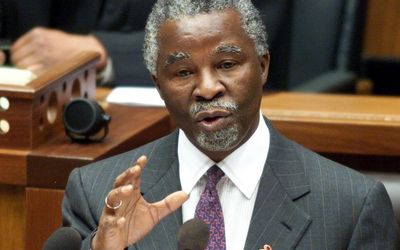IN FEBRUARY 2013, the results of a study of mortality in SA were published in the journal, Science. Using data gathered from more than 101,000 people in rural KwaZulu-Natal, the authors measured changes in adult life expectancy from 2000 to 2011. In 2003, the year before antiretrovirals (ARVs) became available in the public health-care system, adult life expectancy was 49.2 years. By 2011, it had risen to 60.5 years.
Such dramatic changes are in most circumstances achieved over the course of generations. In SA, it took less than a decade. If evidence were still needed that ARV treatment had turned the tide of HIV/AIDS deaths, here it was. Only an ostrich, shoulders-deep in dirt, might miss the evidence.
So, why is former president Thabo Mbeki still playing the ostrich? What is going on with him? Mbeki is on record as saying that psychological speculation has no place in studies of political leadership; that to understand why a leader does what he does, one need only study his reasoning and arguments.
But Mbeki’s own position on HIV/AIDS shows us why, in some instances, psychological speculation is necessary. His continuing failure to see the obvious is so puzzling that one is compelled to wonder what is happening inside him.
One possible explanation is narcissism. Perhaps, when Mbeki looks back at the past, he divides everything he sees into two categories: those events that validate his judgment and those that might be seen to condemn it. The second category is intolerable to him. His excursions into history are thus single-minded in intent; they are to prove that he was never wrong, to organise the past such that everything that happened there confirms his rectitude.
For a man such as Mbeki, who for many years was harnessed to the burden of leadership, this must be an exhausting task.
How does a former president who lost control of his party convince the historical record to sing in praise of his good judgment? How does a leader who counselled against ARV medicine acknowledge that if he had had his way, adult life expectancy in rural KwaZulu-Natal would still be about 49 years? This would be hard for anybody to swallow; but for a man who is abundantly proud, it must be intolerable.
There is another plausible explanation for Mbeki’s puzzling views. A decade-and-a-half ago, Mark Gevisser, Mbeki’s biographer, asked Mbeki why, if HIV/AIDS were a disease of poverty, many middle-class people had succumbed to it.
Mbeki replied by recounting a conversation he had with former Zambian president Kenneth Kaunda after Kaunda’s son died of HIV/AIDS. Independence in Zambia, Mbeki told Kaunda, had led to a cohort of young people suddenly becoming wealthy. Their wealth went to their heads. They bought fancy cars and "were in and out of bed with prostitutes". Kaunda’s son, Mbeki speculated, was probably chronically infected with sexually transmitted diseases, which weakened his immune system.
The same happened in SA when freedom came in the 1990s, Mbeki told Gevisser. "I promise you, you see it in D-Gs (directors-general) here, those sorts of people. They are suddenly landed with lots of money.… And the Mercedes and the BMW, and the particular lifestyle develops…. They haven’t settled down. They’re not accustomed to it."
These are bracing views. You would expect them from an unreconstructed white man, and, even then, only once a few hours of beer and braaivleis had loosened his tongue. Mbeki has imbibed the cruellest, most racist view of HIV/AIDS, one that insists, to quote his own famous words, that his people "are doomed to a mortal end, because of our unconquerable devotion to the sin of lust".
No wonder there is so much at stake for him; if the HIV/AIDS orthodoxy is right, the moral judgment cast upon the South Africans who took office in the mid-1990s is, in his eyes, unbearable.
The burden Mbeki carries is awful. A man deeply invested in the value of his wisdom must confront evidence that his judgment caused people to die. A man who feels contempt for the black noveau riche needs to hide from himself the cruelty of his own moral judgments. In the letters he is writing each week, Mbeki is exposing to us the demons that haunt him.
• Steinberg teaches African studies at Oxford University and is a visiting professor at the Wits Institute for Social and Economic Research.

Thabo Mbeki. Picture: REUTERS
IN FEBRUARY 2013, the results of a study of mortality in SA were published in the journal, Science. Using data gathered from more than 101,000 people in rural KwaZulu-Natal, the authors measured changes in adult life expectancy from 2000 to 2011. In 2003, the year before antiretrovirals (ARVs) became available in the public health-care system, adult life expectancy was 49.2 years. By 2011, it had risen to 60.5 years.
Such dramatic changes are in most circumstances achieved over the course of generations. In SA, it took less than a decade. If evidence were still needed that ARV treatment had turned the tide of HIV/AIDS deaths, here it was. Only an ostrich, shoulders-deep in dirt, might miss the evidence.
So, why is former president Thabo Mbeki still playing the ostrich? What is going on with him? Mbeki is on record as saying that psychological speculation has no place in studies of political leadership; that to understand why a leader does what he does, one need only study his reasoning and arguments.
But Mbeki’s own position on HIV/AIDS shows us why, in some instances, psychological speculation is necessary. His continuing failure to see the obvious is so puzzling that one is compelled to wonder what is happening inside him.
One possible explanation is narcissism. Perhaps, when Mbeki looks back at the past, he divides everything he sees into two categories: those events that validate his judgment and those that might be seen to condemn it. The second category is intolerable to him. His excursions into history are thus single-minded in intent; they are to prove that he was never wrong, to organise the past such that everything that happened there confirms his rectitude.
For a man such as Mbeki, who for many years was harnessed to the burden of leadership, this must be an exhausting task.
How does a former president who lost control of his party convince the historical record to sing in praise of his good judgment? How does a leader who counselled against ARV medicine acknowledge that if he had had his way, adult life expectancy in rural KwaZulu-Natal would still be about 49 years? This would be hard for anybody to swallow; but for a man who is abundantly proud, it must be intolerable.
There is another plausible explanation for Mbeki’s puzzling views. A decade-and-a-half ago, Mark Gevisser, Mbeki’s biographer, asked Mbeki why, if HIV/AIDS were a disease of poverty, many middle-class people had succumbed to it.
Mbeki replied by recounting a conversation he had with former Zambian president Kenneth Kaunda after Kaunda’s son died of HIV/AIDS. Independence in Zambia, Mbeki told Kaunda, had led to a cohort of young people suddenly becoming wealthy. Their wealth went to their heads. They bought fancy cars and "were in and out of bed with prostitutes". Kaunda’s son, Mbeki speculated, was probably chronically infected with sexually transmitted diseases, which weakened his immune system.
The same happened in SA when freedom came in the 1990s, Mbeki told Gevisser. "I promise you, you see it in D-Gs (directors-general) here, those sorts of people. They are suddenly landed with lots of money.… And the Mercedes and the BMW, and the particular lifestyle develops…. They haven’t settled down. They’re not accustomed to it."
These are bracing views. You would expect them from an unreconstructed white man, and, even then, only once a few hours of beer and braaivleis had loosened his tongue. Mbeki has imbibed the cruellest, most racist view of HIV/AIDS, one that insists, to quote his own famous words, that his people "are doomed to a mortal end, because of our unconquerable devotion to the sin of lust".
No wonder there is so much at stake for him; if the HIV/AIDS orthodoxy is right, the moral judgment cast upon the South Africans who took office in the mid-1990s is, in his eyes, unbearable.
The burden Mbeki carries is awful. A man deeply invested in the value of his wisdom must confront evidence that his judgment caused people to die. A man who feels contempt for the black noveau riche needs to hide from himself the cruelty of his own moral judgments. In the letters he is writing each week, Mbeki is exposing to us the demons that haunt him.
• Steinberg teaches African studies at Oxford University and is a visiting professor at the Wits Institute for Social and Economic Research.





















Change: 1.19%
Change: 1.36%
Change: 2.19%
Change: 1.49%
Change: -0.77%
Data supplied by Profile Data
Change: 0.38%
Change: 0.69%
Change: 1.19%
Change: 0.00%
Change: 0.44%
Data supplied by Profile Data
Change: 0.12%
Change: 0.08%
Change: 0.42%
Change: 0.51%
Change: 0.58%
Data supplied by Profile Data
Change: -0.82%
Change: -0.62%
Change: -0.25%
Change: -0.51%
Change: -1.09%
Data supplied by Profile Data